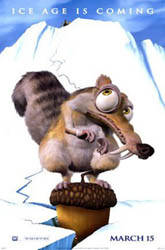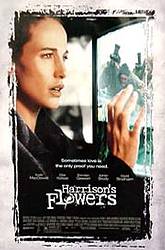 Director: Starring:
OTHER REVIEWS: Chicken
Run Dinosaur Monsters,
Inc. Shrek Titan
A.E. |
Ice Age BY: DAVID PERRY A trio of prehistoric animals headline the latest CGI animated feature to come out of Hollywood with Ice Age. This, the first completely CGI film from Fox (their only other work was on parts of Titan A.E.), joins Disney/Pixar's Monsters, Inc., Toy Story, Toy Story 2, and A Bug's Life, DreamWorks' Antz and Shrek, Paramount's Jimmy Neutron: Boy Genius, and Columbia's Final Fantasy: The Spirits Within. And, when all the dust clears, it stands as the least satisfying of the group. Ice Age is a ludicrous exercise in kiddie pacification -- it is a movie devoted to giving children the easiest pleasures to ensure that it can have their attention and their devotion when it is released into video stores. I find it perfect that next week sees the reissue of E.T.: The Extra-Terrestrial, one of the best family films that not only enlightens the minds of the children, but also never panders to them. For what seems like an eternity, Ice Age moves glacially through plot points that could be mapped out by anyone who has seen more than a couple animated films in their lives. Two works I liked last year -- Shrek and Monters, Inc. -- worked with similar plots without going into the lowest common denominator in children's narrative storytelling. Yeah, we've already seen the dueling pair of odd creatures and the journey involved in returning a cute tyke to his or her parents. But Shrek, with its ogre and donkey duo, and Monsters, Inc., with its bedroom frighteners trying to return a small child, precedes Ice Age in both release date and artistic credibility. Also next week commemorates the first Best Animated Feature Academy Award, where the two aforementioned films are nominated -- here's hoping that the nominating group in the category who somehow missed out on the achievement of Waking Life, will not fall for Ice Age like they did with Jimmy Neutron: Boy Genius. For this film, the fight is between a mammoth named Manfred (Romano) and a sloth named Sid (Leguizamo) who are intent on returning a human baby to his tribe. They are joined by Diego (Leary), a saber tooth who brought about the initial abduction of the child and is only helping them so that he can bring the hulking mammoth to his tiger den. All this happens while the group walks into the snowy glaciers cascading across the open terrain. The film opens with the exploits of an antediluvian mammal called Scrat (Wedge), part squirrel, part rat, who puts the events together that allow the next ice age to occur in the film's opening scene. This sequence, as well as the couple other moments with Scrat throughout the movie, could have made some terrific short films like the occasional products of Pixar (like the Oscar nominated For the Birds, which came out with Monsters, Inc.). As part of Ice Age as a whole, though, it serves as a mere reminder of what the filmmakers are equipped to do, even if they are unwilling to do it with the main story. Much of the movie falls flat with the movie's incorrigible sentimentality that screams of contrivance. There's nothing wrong with some sentiment, but this movie seems determined to have some that what is there feels incredibly forced. A back story for Manfred is especially worrying, as well as some scenes involving the relationships between the animals and the humans. The actors delivering the voices also fail to bring in the
needed appeal of Nathan Lane or Billy Crystal. Leary is too cold, Romano is too dull, and
Leguizamo is too annoying -- this is a trio of actors who have never really proven
themselves in any capacity beyond their comedic niches. Perhaps the most telling of all
this is that they most likable and interesting character is Scrat, and he has no dialogue. |


